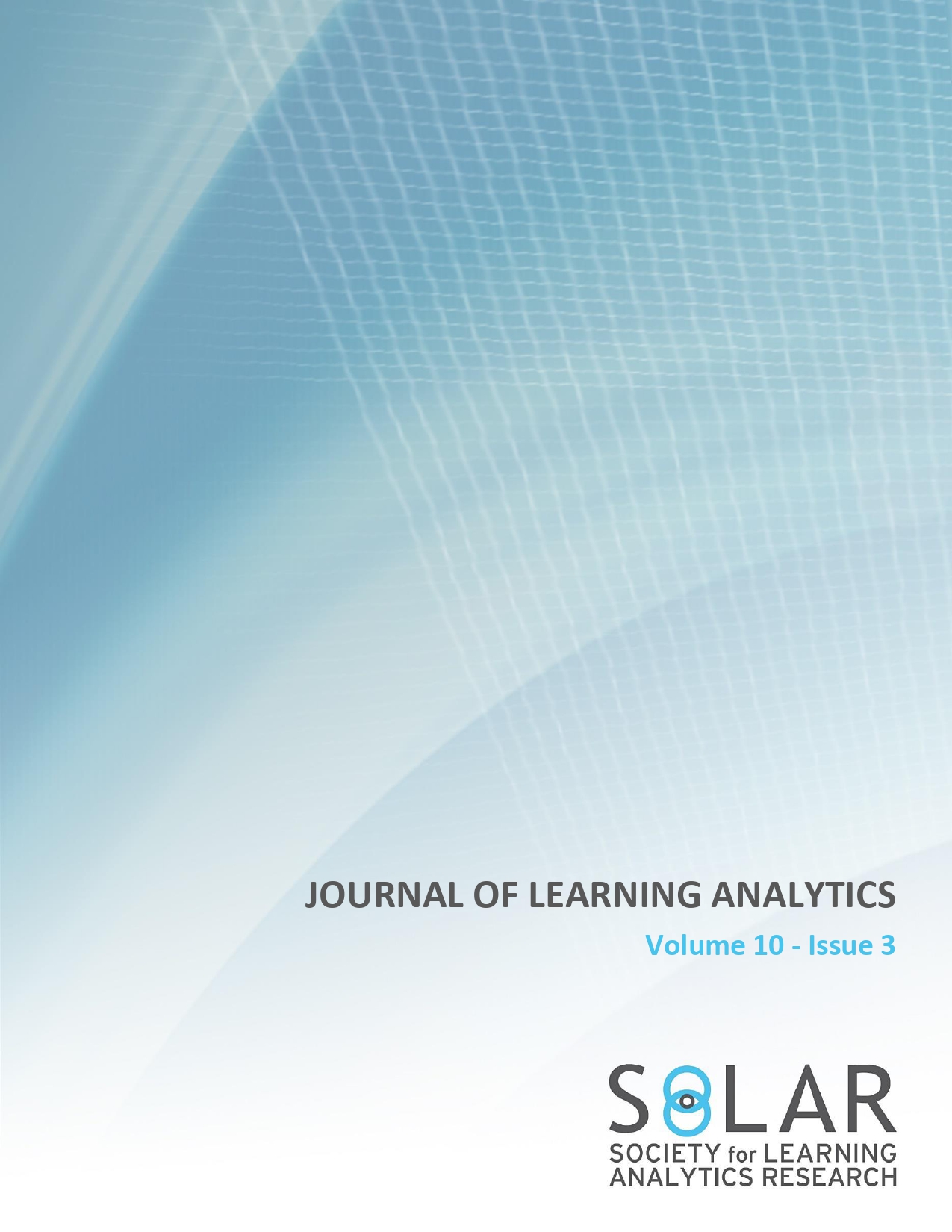Generative AI and Learning Analytics
DOI:
https://doi.org/10.18608/jla.2023.8333Keywords:
generative AI, GenAI, learning analytics, research, practice, editorialAbstract
This editorial looks back at the Journal of Learning Analytics (JLA) in 2023 and forward to 2024. Considering the recent proliferation of large language models such as GPT4 and Bard, the first section of this editorial points to the need for robust Generative AI (GenAI) analytics, calling for consideration of how GenAI may impact learning analytics research and practice. The second section looks back over the past year, providing statistics on submissions and considering the cost of publication in an open-access journal.
References
Chen, J., Liu, Z., Huang, X., Wu, C., Liu, Q., Jiang, G., Pu, J., Lei, Y., Chen, X., Wang, X., Lian, D., & Chen, E. (2023). When large language models meet personalization: Perspectives of challenges and opportunities. arXiv preprint. https://arxiv.org/pdf/2307.16376.pdf
Chiu, T. (2023). The impact of generative AI (GenAI) on practice, policies and research directions in education: A case of ChatGPT and Midjourney. Interactive Learning Environments. https://doi.org/10.1080/10494820.2023.2253861
Chui, M., Hazan, E., Roberts, R., Singla, A., & Smaje, K. (2023). The economic potential of generative AI. McKinsey & Company. https://www.mckinsey.com/capabilities/mckinsey-digital/our-insights/the-economic-potential-of-generative-ai-the-next-productivity-frontier
Collyer, F. M. (2018). Global patterns in the publishing of academic knowledge: Global North, global South. Current Sociology, 66(1), 56–73. https://doi.org/10.1177/0011392116680020
Cotton, D., Cotton, P., & Shipway, R. (2023). Chatting and cheating: Ensuring academic integrity in the era of ChatGPT. Innovations in Education and Teaching International. https://doi.org/10.1080/14703297.2023.2190148
Djuper, P. A. (2015). Peer reviewing in political science: New survey results. PS: Political Science & Politics, 48(2), 346–352. https://doi.org/10.1017/S1049096514002315
Hao, R., Liu, D., & Hu, L. (2023). Enhancing human capabilities through symbiotic artificial intelligence with shared sensory experiences. arXiv preprint. https://arxiv.org/pdf/2305.19278.pdf
Javaid, M., Haleem, A., Singh, R., Khan, S., & Khan, I. (2023). Unlocking the opportunities through ChatGPT tool towards ameliorating the education system. BenchCouncil Transactions on Benchmarks, Standards and Evaluation, 3(2), 1001155. https://doi.org/10.1016/j.tbench.2023.100115
Khosravi, H., Buckingham Shum, S., Chen, G., Conati, C., Tsai, Y. S., Kay, J., Knight, S., Martinez-Maldonado, R., Sadiq, S., & Gašević, D. (2022). Explainable artificial intelligence in education. Computers and Education: Artificial Intelligence, 3, 100074. https://doi.org/10.1016/j.caeai.2022.100074
Liu, M., Ren, Y., Nyagoga, L. M., Stonier, F., Wu, Z., & Yu, L. (2023). Future of education in the era of generative artificial intelligence: Consensus among Chinese scholars on application of ChatGPT in schools. Future in Educational Research 1(1), 72–101. https://doi.org/10.1002/fer3.10
MacNeil, S., Tran, A., Kim, J., Huang, Z., Bernstein, S., & Mogil, D. (2023). Prompt middleware: Mapping prompts for large language models to UI affordances. arXiv preprint. https://arxiv.org/pdf/2307.01142.pdf
Moreno, J. (2023). ChatGPT for schools? Merlyn Mind launches education-specific LLM. Forbes. https://www.forbes.com/sites/johanmoreno/2023/06/26/chatgpt-for-schools-merlyn-mind-launches-education-specific-llm/
Morris, S. (2005). The true costs of scholarly journal publishing. Learned Publishing, 18(2), 115–126. https://onlinelibrary.wiley.com/doi/pdf/10.1087/0953151053584975
Mulligan, A., Hall, L., & Raphael, E. (2013). Peer review in a changing world: An international study measuring the attitudes of researchers. Journal of the American Society for Information Science and Technology, 64(1), 132–161. https://doi.org/10.1002/asi.22798
Nguyen, N., & Nadi, S. (2022). An empirical evaluation of GitHub copilot’s code suggestions. Proceedings of the 19th International Conference on Mining Software Repositories (MSR ’22), 23–24 May 2022, Pittsburgh, PA, USA (pp. 1–5). ACM Press. https://doi.org/10.1145/3524842.3528470
Pinfield, S., Salter, J., & Bath, P. A. (2016). The “total cost of publication” in a hybrid open‐access environment: Institutional approaches to funding journal article‐processing charges in combination with subscriptions. Journal of the Association for Information Science and Technology, 67(7), 1751–1766. https://doi.org/10.1002/asi.23446
Puehringer, S., Rath, J., & Griesebner, T. (2021). The political economy of academic publishing: On the commodification of a public good. PLOS One, 16(6). https://doi.org/10.1371/journal.pone.0253226
Salemi, A., Mysore, S., Bendersky, M., & Zamani, H. (2023). LaMP: When large language models meet personalization. arXiv preprint. https://arxiv.org/abs/2304.11406
Shen, J., Zhang, C. J. P., Jiang, B., Chen, J., Song, J., Liu, Z., He, Z., Wong, S. Y., Fang, P.-H., & Ming W.-K. (2019). Artificial intelligence versus clinicians in disease diagnosis: Systematic review. JMIR Medical Informatics, 7(3), e10010. https://doi.org/10.2196/10010
Stokel-Walker, C., & Van Noorden, R. (2023). What ChatGPT and generative AI mean for science. Nature, 614(7947), 214–216. https://www.nature.com/articles/d41586-023-00340-6
Susskind, R. (2023). Tomorrow’s lawyers: An introduction to your future. Oxford University Press. https://global.oup.com/academic/product/tomorrows-lawyers-9780192864727?cc=ca&lang=en
Swiecki, Z., Khosravi, H., Chen, G., Martinez-Maldonado, R., Lodge, J. M., Milligan, S., Selwyn, N., & Gašević, D. (2022). Assessment in the age of artificial intelligence. Computers and Education: Artificial Intelligence, 3, 100075. https://doi.org/10.1016/j.caeai.2022.100075
Van Noorden, R. (2013). Open access: The true cost of science publishing. Nature, 495, 426–429. https://doi.org/10.1038/495426a
Ware, M., 2008. Peer review in scholarly journals: Perspective of the scholarly community — Results from an international study. Information Services & Use, 28(2), 109–112. http://dx.doi.org/10.3233/ISU-2008-0568
Zhang, C., Zhang, C., Zhang, M., & Kweon, I. S. (2023). Text-to-image diffusion model in generative AI: A survey. arXiv preprint. https://arxiv.org/pdf/2303.07909.pdf
Downloads
Published
How to Cite
Issue
Section
License
Copyright (c) 2023 Journal of Learning Analytics

This work is licensed under a Creative Commons Attribution-NonCommercial-NoDerivatives 4.0 International License.
TEST


